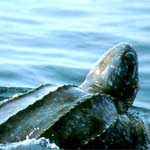 |
| Kathleen Martin and Mike James picked up their prize at a ceremony in Montreal earlier this month. (Normand Huberdeau, Canadian Environment Awards 2007) |
A decade ago, Mike James and Kathleen Martin set out to protect the endangered leatherback sea turtle. They had one problem: no one really believed the world's largest reptile was anything more than a tourist to Atlantic Canadian waters.
"At the time, most people believed that leatherbacks seen here were somehow blown off course," explains Dr. James, honorary adjunct professor at HÂş» University. "There simply wasn't a history of research here."
Undeterred, the couple founded the Nova Scotia Leatherback Turtle Working Group (NSLTWG) and took their quest directly to the community with a poster campaign asking, "Have you seen this turtle?" In the first two seasons, they visited hundreds of wharves in Nova Scotia and Prince Edward Island, meeting with fishermen and encouraging them to call a toll-free line to report their encounters with the turtles.
|
After a decade of committed work, NSLTWG has established that not only do turtles come to east coast waters, they come regularly. Their work has spawned a revolutionary model for marine conservation. (Dr. James just returned from Monterey, Cal., where researchers there are using the east-coast model to research leatherbacks in the Pacific Ocean at high latitudes.) Annual visits to coastal villages have earned the loyal participation of hundreds of volunteer fishermen, as well as naturalists, tour-boat operators and community members, who have learned techniques for disentangling turtles from fishing gear, the chief threat to the leatherback's survival.
NSLTWG has also tracked male leatherbacks on migratory routes from Nova Scotia all the way down to Trinidad. And some of the female turtles theyÃve tagged around here have been observed on nesting beaches in Central America, South America and the Caribbean.
There's an urgency to their work: the species is in precipitous decline in the world's oceans. More than 90 per cent of leatherback turtles - a species with a lineage stretching back to the days of the dinosaur - have vanished in the past 20 years.
Gold medal award
Now their pioneering work has earned them a prestigious award à a gold medal for conservation by the Canadian Environment Awards. They're keeping it in the HÂş» family à last year the award was won by Dal biology professor Bill Freedman for his work with the Nature Conservancy of Canada.
"To be recognized with a national award is just so gratifying," says Ms. Martin, "especially because at the beginning, no one really thought sea turtles were even here."
Ellen Kenchington, a scientist at the Bedford Institute of Technology, nominated the couple for the award.
"What impressed me is how they brought fishermen aboard and really engaged regular people in conservation," she says.
Field season starting
Field season is now beginning for the group à a fisherman reported the first leatherback sighting just days ago near Pubnico. A team, including Dr. James and a couple of graduate students, aim to head out on the water on Monday à ÃThe jellyfish are a good size and the water is about 12 C, so itÃs warm enough for them, but itÃs anyoneÃs guess on when theyÃll hit,â says Dr. James.
This summer, they'll continue to do live captures of the turtles: photographing, weighing, measuring, taking tissue and blood samples, and tagging them. They'll also be doing research about the jellyfish the turtles feed on.
"Everyone's on adrenalin here," says Ms. Martin with a laugh. ÃWeÃre all raring to get going.â

